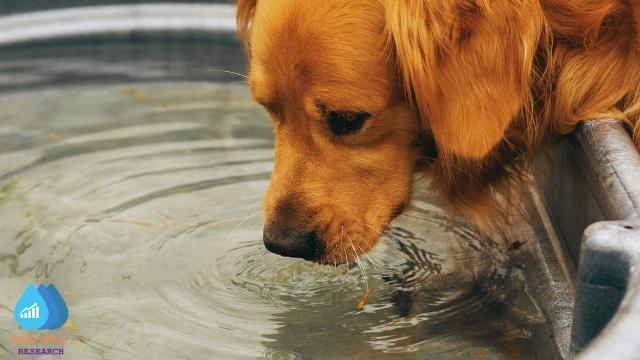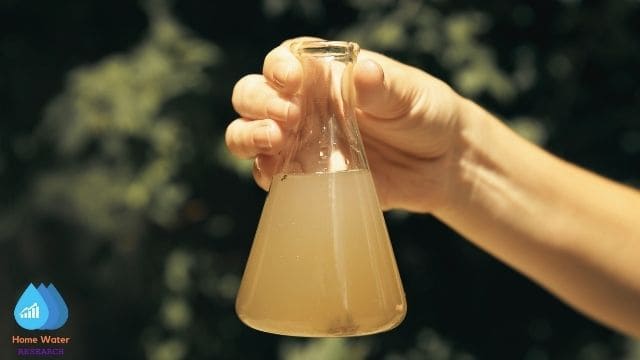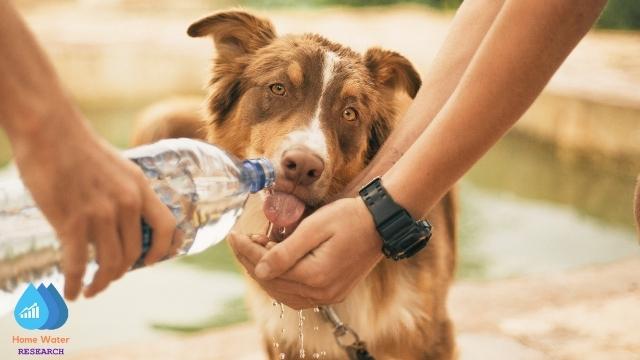
If you’re in an urban area, you needn’t worry too much; city water is treated and tested. But for over 15% of the population, a private well is our only access to clean water. And while this water might be healthy for us, is it safe for dogs?
Today, we’ll be settling once and for all if dogs can drink well water, what implications this may cause, and how we can ensure our furry friend’s safety and proper hydration.
And if you’re concerned that your dog’s water is making it sick, skip ahead and do this one thing right now.
Is Well Water Safe for Dogs?
Well water is not always safe for dogs to drink. This is because wells can be contaminated with heavy metals, nitrates, or bacteria.
It’s also common for well-water to have high mineral content (i.e., hard water), which can also cause problems for dogs. Well water can be safe for dogs when it’s filtered or treated.
Since dogs don’t sweat as much as humans, they don’t filter out contaminants as effectively. So ingesting untreated well water can cause severe diarrhea and vomiting. Worse, it could result in seizures, which are fatal for animals.

Unless it’s impossible, we would recommend giving them filtered or at least soft water. The presence of chemicals and other contaminants may lead to adverse health problems.
We’ll be expounding on this a bit in the next section.
Common Well Water Contaminants
Water is all around us. This means it mixes with different parts of the environment. More so for well water, which flows underground and can be easily tainted with various minerals, chemicals, and heavy metals.
Although most are harmless, having too much of some isn’t good for your pet’s health. As dog owners, here are some of the contaminants to water out for:
- Magnesium
- Calcium
- Nitrates
- Iron
- Phosphorus
- Sulfur
- Blue-Green Algae
- Bacteria.
Well Water Contaminants and Their Effects on Dogs
Some contaminants are more dangerous than others. Now, we’ll be identifying six of the most harmful toxins and how they could potentially affect their overall well-being. Many of these contaminants also determine whether well water is safe to drink for humans too.
Is Sulfur in Drinking Water Bad for Dogs?
Just like humans, drinking water with high levels of sulfur can cause digestive distress. For dogs, this may lead to constant retching, diarrhea, and possibly, dehydration.
Because dogs are instinctive creatures, the foul taste may force them to lose their appetite altogether [source].
The good news, though, is sulfur is seen more as an irritant, which means it’s not fatal. But just to be safe, seek veterinary advice immediately when your water smells like rotten eggs. This way, they can prescribe preventive medicine already.
Is Iron in Drinking Water Bad for Dogs?
Small amounts of iron are considered safe – and have several benefits – but too much may lead to health issues. Symptoms include extreme body pains (particularly in the abdomen) and fatigue.
Iron poisoning can happen, too, but very rarely is your dog’s water so contaminated with iron that it becomes hazardous. Just occasionally monitor this element’s presence to be sure.
Too much iron in drinking water can also cause discoloration and a bad taste, which may discourage your dog from drinking enough.

Is Calcium in Drinking Water Bad for Dogs?
Calcium is one of the most common minerals found in well water, and isn’t usually harmful to your dog. It helps a lot with bone development and blood clotting.
The only reported health problems of too much calcium are bladder stones and minor kidney complications. The link between calcium in water and pet urinary issues comes from a 2016 study that found areas with hard water had higher pet insurance payouts for urinary conditions.
Is hard water bad for dogs?
Yes, hard water may be harmful to dogs. Trupanion, a pet insurance company, found that states in the US with hard water had higher insurance payouts for pet urinary issues than states with soft water.
Are Nitrates in Drinking Water Bad for Dogs?
Medical claims state that it’s typically harmless, but too much can be harmful. Your pet dog, in particular, could develop serious health problems like difficulty breathing, urinary issues, and convulsions.
The Environmental Protection Agency (EPA) prescribes a maximum limit of 10 milligrams per liter of Nitrates in water.
Which Bacteria in Water is Bad for Dogs?
There are many harmful bacteria to watch out for in your dog’s water. Leptospira could cause Leptospirosis, an often deadly disease.
Giardia, Salmonella, and E-Coli are other microorganisms that can make a dog sick. Symptoms include constant throwing up and uncontrollable spasms.
Urinary Tract Infections and Other Common Signs That Your Dog is Sick from Well Water

Here is a list of some symptoms that could signal your dog is sick from drinking well water [1,2] :
- Unusual laziness
- Drowsiness
- Confusion
- Diarrhea
- A sudden increase in thirst
- Discomfort while urinating
- Algae in stool or urine
- Dehydration
- Rashes
- Red eyes
- Muscle spasms
- Rapid heartbeat
- Weightloss
Urinary disease, diarrhea, or being in a semi-comatose state are early signs that your dog isn’t feeling well. So watch out for these early symptoms. If not treated right away, their condition could worsen into seizures, bladder health issues, and dehydration, which is especially dangerous for female dogs about to give birth.
If you notice any of these symptoms, contact your vet at once for a consultation.
What Should You Do if Your Well Water is Making Your Dog Sick?
As dog owners, we are responsible for monitoring our pet’s water. If you notice anything unusual, here are some helpful everyday remedies.
1. Switch to Bottled Water Immediately & See a Vet
Bottled water is expensive, but it’s also safe to drink. Switch to bottled water immediately, and you’ll be sure your dog is drinking uncontaminated water.
There are some worries about BPAs in bottled water, but this only causes problems in the long term. So bottled water is a suitable temporary solution in this situation.
Continue with bottled water until you’ve tested your water, identified the problem, and taken water treatment or purification measures.
Next, get on the phone and book an appointment with your local veterinary surgery.

2. Get Your Water Tested
Without knowing, the water you drink at home could be exposing your pets to viruses and other illnesses. One way of making sure is by regularly conducting tests.
Don’t worry if this sounds complicated. Sites like MyTapScore provide beginners like yourself with enough helpful information and a quick assessment that yields accurate results.
3. Install a treatment or purification solution
Depending on your water quality test results, you’ll need to take one of the two below steps.
For Hard Water: Install a Water Softener
Extremely hard tap water is filled with high levels of minerals, and can be unappetizing. A high-quality softener can do wonders to remove excess magnesium, calcium, and chlorine.
If you’re still unsure which one to buy, you can check out this article on the best water softeners for well water.
Among the choices, we would recommend the salt-based one offered by SpringWell. It’s highly reliable, uses up 40-percent less detergent, and reduces spotting on hard surfaces. Check out their later offers by visiting their website.
For Iron, Manganese, & Heavy Metals: Get a Well Filter
Since there are so many possible pollutants around us, sometimes a water softener won’t be enough. You might already need an iron well filter.
A good well water filter will remove unwanted iron particles and other common contaminants. It forces the liquid through an oxidation process, locating and eliminating these potentially dangerous molecules. [source]
You can learn more about the best whole house filters for well water by reading this article.
Frequently Asked Questions
Now that we’re nearing the end of this article, here are some of the most frequently asked questions about dogs and well water:
Can Well Water Give Dogs Diarrhea?
Yes, the presence of various bacteria and microorganisms can cause your dog to have digestive distress. It can also lead to urinary health issues and nervous system issues.
Can Dogs Drink Bottled Water?
Absolutely! Bottled water is safe to drink because its manufacturing process already eliminates harmful contaminants. Just make sure these are distributed in PET or PETE1 bottles. If not, the bottles could contain Bisphenol A (BPA), which is toxic to animals.
Final thoughts
In conclusion, it isn’t at all advisable for dogs to drink water directly from wells. It poses too much of a risk, which could potentially lead to severe diseases later on.
So to prevent any untoward incidents, we would advise you to have your well water checked regularly, use a softener, or invest in a whole house filtration system. This may be a substantial initial outlay, but it will save you time and money if your pet eventually gets sick.
Remember, in instances like this; prevention is always better than cure.
